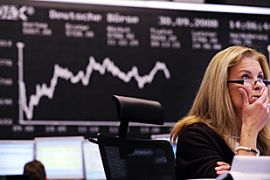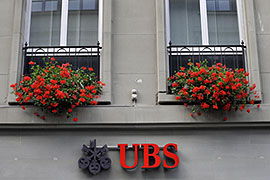Europe markets stable after US vote
Continent’s indices makes slight gains after US senate approves $700bn bank rescue plan.

Senate approval
American senators approved the bailout bill by 74 votes to 25 on Wednesday. The bill will now move to the House of Representatives, which had rejected an earlier version of the bailout on Monday.
Al Jazeera’s Rosalind Jordan at the US senate said the plan had been approved by a greater margin than expected after the bill’s rejection earlier in the week.
The House of Representatives is set to vote on the amended bill as early as Friday.
Although European markets were broadly stable on Thursday, Asia-Pacific markets were all trading down by midday.
 |
| Banking stocks performed well in European trading on Thursday [AFP] |
Japan’s benchmark Nikkei index was down 1.88 per cent at the close of trade, falling to its lowest level in three years.
In South Korea the Kospi index was down 1.33 per cent by midday, while in Sydney the S&P/ASX 200 dipped 0.5 per cent after the US vote.
The poor performance on Asian stock markets highlight investor nervousness over whether a US government bailout will be enough to shore up the US banking system.
Melissa Chan, Al Jazeera’s correspondent in Hong Kong, said it would take time for people in Asia to feel the effects of what is happening in the US economy.
“At the moment, when you talk to the ordinary person on the street here in Hong Kong, they are concerned with the milk powder scare,” she said.
“People are not seeing anything change in China, like the cost of food rising, for example. On the mainland in China, many people think that China will weather this [the US crisis] in the same way that it weathered the Asian financial crisis in 1997, even though experts say it is like comparing apples and oranges.”
House vote
Speaking after Wednesday’s senate vote, Harry Reid, the senate Democratic leader, said he expected the House of Representatives to approve the bill.
George Bush, the US president, said the state of the US economy demanded the bailout package be approved.
“The American people expect – and our economy demands – that the House pass this good bill this week and send it to my desk,” Bush said in a statement.
Opponents of the bill have expressed concerns over handing that much power to one man, and reject the idea of using taxpayer money to bail out disgraced Wall Street firms.
| IN DEPTH |
|
|
Maya Rockeymoore, an analyst from Global Policy Solutions, told Al Jazeera that the bill was “tilted towards Wall Street” and that it did not do enough to aid the millions facing home foreclosures as a result of the subprime mortgage crisis.
“There are many people that believe this is not the bill that the United States needs,” she said.
But Toby Chaudhuri, a Democrat strategist, said that the bailout plan was the only solution to stave off a wider banking crisis.
“The reason we are in this mess is due to years of deregulation that House conservatives have pushed for years and years and years,” he told Al Jazeera.
“The reason why we are having to do this bailout is not to simply help a few folks on Wall Street. It is really because the credit markets are going to dry up if we do not put assets back into the system.”
Financial turmoil
Weeks of financial turmoil were sparked after several major US financial institutions collapsed or were forced to the brink of bankruptcy following losses sustained in the subprime mortgage crisis.
Other global financial institutions have been caught up in the crisis, which has caused chaos on global markets.
The senate vote was called late on Tuesday, after Democratic and Republican negotiators agreed on the terms of the amended bailout, which includes extended tax cuts for businesses.
| IN VIDEO | ||
|
In another new measure, the bill, which required 60 votes in the 100-member senate to pass, raises the limit on federal insurance for bank deposits from $100,000 to $250,000.
Barack Obama, the US Democratic presidential candidate and Illinois senator, had told the senate that while the revised plan was not perfect, it needed to be passed.
“It’s clear that, from my perspective, that this is what we need to do right now to prevent the possibility of a crisis turning into a catastrophe.”
John McCain, the Republican candidate, also left the campaign trail to return to Washington for the vote.
The amended bill retains most facets of the original plan which gives Henry Paulson, the US treasury secretary, the power to buy failing mortgage-related assets from troubled banks and includes restrictions on pay-offs to financial executives.

